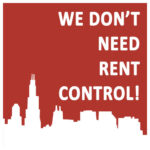 A day after CNN reported of the death of a New Yorker who had been paying $28 per month in rent as a result of a rent controlled property she rented from 1955 to 2018, reports come out of Springfield that the Illinois legislature seems to be stalling in attempts to overturn the Illinois’s Rent Control Preemption Act. The Real Deal, a Chicago real estate web news organization, indicates that legislation to repeal the law that protects Illinois landlord’s from municipalities seeking to impose rent control policies has stalled with only a few weeks left in the summer session.
A day after CNN reported of the death of a New Yorker who had been paying $28 per month in rent as a result of a rent controlled property she rented from 1955 to 2018, reports come out of Springfield that the Illinois legislature seems to be stalling in attempts to overturn the Illinois’s Rent Control Preemption Act. The Real Deal, a Chicago real estate web news organization, indicates that legislation to repeal the law that protects Illinois landlord’s from municipalities seeking to impose rent control policies has stalled with only a few weeks left in the summer session.
Democratic State Senator Mattie Hunter introduced a rent control bill that would establish rent control boards who would set limits on annual rental increases. The proposed bill would limit increases to 1 percent above the Consumer Price Index.
Interestingly, the 2018 triennial reassessment of Chicago properties is currently underway. The Cook County Assessor’s valuation statistics indicate that the median increase in assessed value for this reassessment is 31.24%. While property taxes do not experience a dollar-for-dollar increase, this is also only one day after economists at the Chicago Federal Reserve Bank suggested a 10 year property tax based upon 1% of the value of a piece of real estate.
How, exactly, would a rent control bill deal with the property taxes already spiraling out of control? I can guess. They’ll point to the law and will suggest that there’s not much they can do other than allow the maximum rent increase limit of 1% over CPI. This would have the effect of shifting all of these tax burdens to the landlord. This is typical classical rent control and merely a means of income redistribution by social engineers.
Interestingly, no one in the Illinois, Cook County, or Chicago legislature has suggested a cap on spending increases equal to CPI plus 1%.
Landlords, it goes without saying – you need to talk to your representatives on this one.
